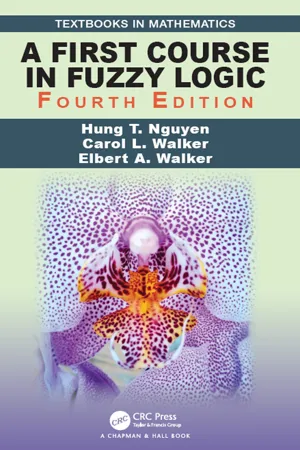
A First Course in Fuzzy Logic
- 448 pages
- English
- ePUB (mobile friendly)
- Available on iOS & Android
A First Course in Fuzzy Logic
About this book
A First Course in Fuzzy Logic, Fourth Edition is an expanded version of the successful third edition. It provides a comprehensive introduction to the theory and applications of fuzzy logic.
This popular text offers a firm mathematical basis for the calculus of fuzzy concepts necessary for designing intelligent systems and a solid background for readers to pursue further studies and real-world applications.
New in the Fourth Edition:
- Features new results on fuzzy sets of type-2
- Provides more information on copulas for modeling dependence structures
- Includes quantum probability for uncertainty modeling in social sciences, especially in economics
With its comprehensive updates, this new edition presents all the background necessary for students, instructors and professionals to begin using fuzzy logic in its many—applications in computer science, mathematics, statistics, and engineering.
About the Authors:
Hung T. Nguyen is a Professor Emeritus at the Department of Mathematical Sciences, New Mexico State University. He is also an Adjunct Professor of Economics at Chiang Mai University, Thailand.
Carol L. Walker is also a Professor Emeritus at the Department of Mathematical Sciences, New Mexico State University.
Elbert A. Walker is a Professor Emeritus, Department of Mathematical Sciences, New Mexico State University.
Tools to learn more effectively

Saving Books

Keyword Search

Annotating Text

Listen to it instead
Information
Table of contents
- Cover
- Half Title
- Title Page
- Copyright Page
- Table of Contents
- Preface
- 1 The Concept of Fuzziness
- 2 Some Algebra of Fuzzy Sets
- 3 Fuzzy Quantities
- 4 Logical Aspects of Fuzzy Sets
- 5 Basic Connectives
- 6 Additional Topics on Connectives
- 7 Fuzzy Relations
- 8 Universal Approximation
- 9 Possibility Theory
- 10 Partial Knowledge
- 11 Fuzzy Measures
- 12 The Choquet Integral
- 13 Fuzzy Modeling and Control
- Bibliography
- Answers to Selected Exercises
- Index
Frequently asked questions
- Essential is ideal for learners and professionals who enjoy exploring a wide range of subjects. Access the Essential Library with 800,000+ trusted titles and best-sellers across business, personal growth, and the humanities. Includes unlimited reading time and Standard Read Aloud voice.
- Complete: Perfect for advanced learners and researchers needing full, unrestricted access. Unlock 1.4M+ books across hundreds of subjects, including academic and specialized titles. The Complete Plan also includes advanced features like Premium Read Aloud and Research Assistant.
Please note we cannot support devices running on iOS 13 and Android 7 or earlier. Learn more about using the app